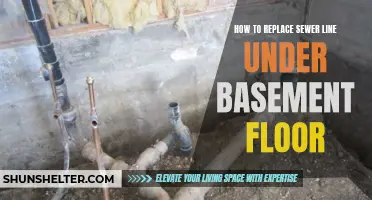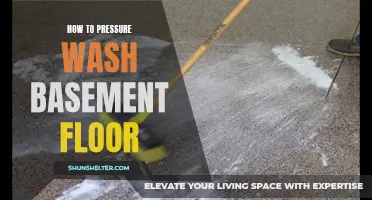
Imagine walking into your basement and discovering water seeping up from the floor. This unexpected sight can be both alarming and perplexing. You may wonder why water is making its way into your basement and what steps you need to take to address this issue. In this article, we will delve into the possible reasons behind water coming up from the basement floor and explore the potential implications of this unusual phenomenon. Get ready to dive into the world of basement water intrusion and uncover the secrets lying beneath your home's foundation.
| Characteristics | Values |
|---|---|
| Water source | Groundwater, rainwater, plumbing |
| Basement floor material | Concrete, tile, carpet |
| Cracks or gaps in the basement floor | Yes, No |
| Poor drainage or water buildup around the foundation | Yes, No |
| High water table or flooding in the area | Yes, No |
| Plumbing issues or leaks | Yes, No |
| Blocked or damaged sewer lines | Yes, No |
| Sump pump failure | Yes, No |
| Exterior grading or landscaping issues | Yes, No |
| Hydrostatic pressure on the basement floor | Yes, No |
| Inadequate waterproofing or sealant on the basement floor | Yes, No |
| Presence of a nearby water source (e.g., river, lake) | Yes, No |
| Poor foundation construction or structural issues | Yes, No |
What You'll Learn

Possible causes of water seeping up from basement floor

Water seeping up from the basement floor can be a frustrating and concerning issue for homeowners. Not only can it cause damage to the basement and its contents, but it can also lead to more serious problems such as mold growth and foundation damage. Understanding the possible causes of water seeping up from the basement floor can help you identify the source of the problem and take appropriate action to address it. In this blog post, we will explore some of the common causes of water seepage and provide some tips on how to deal with them.
- Poor drainage: One of the most common causes of water seeping up from the basement floor is poor drainage around the foundation of the house. If the soil around your foundation does not slope away from the house, or if you have clogged or insufficient gutters and downspouts, water can accumulate around the foundation and eventually find its way into the basement. To address this issue, make sure that the soil around your foundation slopes away from the house, and clean and maintain your gutters and downspouts regularly.
- Cracks in the foundation: Another possible cause of water seepage is cracks in the foundation. Over time, the soil around the foundation can expand and contract, putting pressure on the foundation walls and causing them to crack. These cracks can then allow water to seep into the basement. If you suspect that cracks in the foundation are the cause of your water seepage problem, it is important to have them properly assessed and repaired by a professional.
- High water table: A high water table, or the level at which the ground is saturated with water, can also cause water to seep up from the basement floor. When the water table rises above the level of your basement floor, it can create hydrostatic pressure that forces water into the basement. Unfortunately, addressing a high water table can be a more complex issue, and it may require the installation of a sump pump or other drainage systems.
- Plumbing leaks: Sometimes, water seepage in the basement can be caused by plumbing leaks. If there are leaking pipes or fixtures in or around your basement, water can seep into the floor and cause moisture problems. To check for plumbing leaks, inspect the plumbing fixtures in your basement and look for signs of water damage or dampness. If you find any leaks, it is important to have them fixed by a qualified plumber.
- Condensation: Finally, condensation can also contribute to water seepage in the basement. When warm, moist air comes into contact with cool surfaces, such as the concrete floor of a basement, condensation can form and lead to moisture problems. To reduce condensation in your basement, consider using a dehumidifier, improving ventilation, and insulating cold surfaces.
In conclusion, water seeping up from the basement floor can have various causes, including poor drainage, cracks in the foundation, high water table, plumbing leaks, and condensation. Identifying the source of the problem is the first step in addressing it. Depending on the cause, you may need to take actions such as improving drainage, repairing foundation cracks, installing drainage systems, fixing plumbing leaks, or reducing condensation. If you are unsure about the cause or how to fix the problem, it is recommended to consult with a professional waterproofing contractor who can assess the situation and provide appropriate solutions.
The Cost of Digging Another Basement for an Addition: What to Expect
You may want to see also

Understanding the role of groundwater in basement floor water issues

If you have noticed water coming up from your basement floor, you are not alone. Many homeowners face this issue, and it can be quite concerning. However, it is important to understand that water in the basement is often a result of groundwater activity.
Groundwater is the water located beneath the earth's surface in soil pores and in the cracks and crevices of rocks. It plays a crucial role in providing water to wells and springs, and it can also cause water issues in basements. Let's take a closer look at how groundwater can find its way into your basement and what you can do to address the problem.
- Understanding the Water Table: The water table refers to the underground level where the soil and rocks are saturated with water. The height of the water table can vary depending on various factors such as precipitation, soil properties, and nearby bodies of water. When the water table rises above the level of your basement floor, water can seep into your basement through cracks or gaps.
- Hydrostatic Pressure: Hydrostatic pressure is the force exerted by water due to its weight and density. When the water table rises, it increases the hydrostatic pressure on your basement floor. This pressure can push water through any cracks, gaps, or porous materials in your basement, resulting in water seepage.
- Poor Drainage Systems: Another factor that can contribute to water issues in your basement is a lack of proper drainage systems. If your property does not have a well-functioning drainage system, rainwater or excess groundwater can accumulate around your foundation. Over time, this water can find its way into your basement, causing water issues.
- Natural Springs: In some cases, water in the basement may be a result of natural springs. Natural springs occur when groundwater is discharged to the surface of the Earth. If your property is located near a natural spring, water can seep into your basement through cracks or gaps in the foundation.
So, what can you do to address water issues in your basement caused by groundwater? Here are a few steps you can take:
- Identify and Seal Cracks: Inspect your basement for any visible cracks or gaps where water may be seeping in. Seal these cracks using waterproof sealants or hydraulic cement to prevent water from entering.
- Install a Sump Pump: A sump pump can help remove water from your basement by actively pumping it out. A pit is dug in the floor of the basement, and a pump is installed in it. The pump automatically detects water and pumps it out, keeping your basement dry.
- Improve Drainage: Make sure your property has a proper drainage system in place. Ensure that gutters and downspouts direct water away from your foundation. Consider installing French drains or other types of drainage systems to divert water away from your basement.
- Waterproofing: Consider waterproofing your basement walls and floor. This can involve applying waterproofing coatings or membranes to prevent water seepage. Consulting with a professional waterproofing contractor can help you determine the best solution for your basement.
In conclusion, water coming up from the basement floor is often a result of groundwater activity. Understanding the role of groundwater and taking appropriate steps to address the issue can help you keep your basement dry and protect your home from water damage. If you are unsure about the cause of the water issues or need assistance with waterproofing, it is always recommended to consult with a professional who specializes in basement waterproofing.
The Cost of Running Electrical to an Unfinished Basement Explained
You may want to see also

How to prevent water intrusion in basement floors

Water intrusion in basement floors can be a frustrating problem for homeowners. It not only damages the basement floor but also poses a risk of damaging other property stored in the basement. If you are dealing with water coming up from your basement floor, it's important to take action to prevent further damage and find a long-term solution.
Here are some effective ways to prevent water intrusion in basement floors:
- Identify the source of water: Before you can effectively prevent water intrusion, you need to determine the source of the water. Common sources include groundwater, plumbing leaks, and surface water runoff. Identifying the source will help you choose the most appropriate prevention method.
- Install a sump pump: A sump pump is a great investment for preventing water intrusion in basement floors. It works by collecting water in a pit and then pumping it away from your home. Make sure to choose a sump pump with enough power to handle the volume of water in your basement.
- Improve drainage around your home: Proper exterior drainage is crucial in preventing water from seeping into your basement. Ensure that your gutters and downspouts are in good condition and direct water away from your foundation. Grade the soil around your home to slope away from the foundation, preventing water from pooling near the basement.
- Seal cracks and gaps: Inspect your basement and look for any cracks or gaps where water could potentially seep through. Use hydraulic cement or epoxy to fill these openings, ensuring a watertight seal. Pay close attention to areas around windows, doors, and utility penetration points.
- Waterproof your basement walls and floor: Applying a waterproofing material to your basement walls and floor can provide an effective barrier against water intrusion. Use a waterproofing paint or a waterproof membrane specifically designed for basements. Be sure to follow the manufacturer's instructions for proper application.
- Install a French drain system: A French drain is a trench filled with gravel or rock and a perforated pipe that collects and redirects groundwater away from your basement. Installing a French drain system can be a more extensive and costly solution, but it can effectively prevent water from coming up through the basement floor.
- Fix plumbing leaks: Leaky pipes or plumbing fixtures can contribute to water intrusion in your basement. Regularly inspect your plumbing system and promptly fix any leaks you find. If you're unsure about the source of the water, you may want to consult a professional plumber to assess your plumbing system.
- Consider exterior waterproofing methods: In some cases, external waterproofing may be necessary to prevent water intrusion in basement floors. This involves excavating the area around your foundation and applying a waterproof coating to the exterior walls. Although this method is more invasive and costly, it can provide long-term protection against water infiltration.
Preventing water intrusion in basement floors requires a combination of proactive measures and regular maintenance. By addressing the source of water, improving drainage, sealing cracks, and considering appropriate waterproofing methods, you can significantly reduce the risk of water coming up from your basement floor. Remember, if the problem persists or worsens, it's advisable to consult a professional waterproofing contractor for further assistance.
The Cost of Reslabbing a Basement: What to Expect
You may want to see also

Steps to take when water is coming up from the basement floor

Dealing with water coming up from the basement floor is a common issue that many homeowners face. This can be a frustrating and potentially damaging problem, as it can lead to water damage, mold growth, and a host of other issues. If you find yourself in this situation, here are some steps to take to address the problem and prevent further damage.
- Identify the source of the water: Before you can effectively deal with the problem, it's important to determine where the water is coming from. Is it a result of heavy rain or a plumbing issue? Common sources of water infiltration may include cracks in the foundation, faulty or clogged drain tiles, or a high water table in your area. By identifying the source, you can better address the problem and prevent it from happening again in the future.
- Assess the severity of the problem: Depending on the amount of water and the extent of the damage, you may need to take immediate action or call a professional for help. If it's just a small amount of water and you're confident in your DIY abilities, you can proceed with the next steps. However, if the water is excessive or you're unsure about the situation, it's best to consult a professional who specializes in basement waterproofing.
- Remove the water: If the water accumulation is minimal, you can start by using a wet/dry vacuum or a sump pump to remove the water. Start by suctioning the water from the lowest point and work your way to the exit point, whether that's a drain or a nearby window. Pay attention to any electrical cords or outlets to ensure your safety.
- Dry out the affected area: After removing the water, it's crucial to dry out the basement thoroughly. Use fans, dehumidifiers, and open windows if weather permits to increase airflow and speed up the drying process. Mold can start growing within 24-48 hours, so it's important to act quickly to prevent any further damage.
- Repair any cracks or seal leaks: Once the basement is dry, it's important to address the root cause of the water infiltration. If you notice any cracks in the foundation, consider using hydraulic cement or epoxy to seal them. For plumbing-related issues, consult a licensed plumber to identify and fix the problem. Keep in mind that some repairs may require professional assistance, especially if they involve extensive excavation or structural issues.
- Install a basement waterproofing system: If you're experiencing recurring water problems, consider investing in a basement waterproofing system. This can include installing a sump pump, French drains, or a waterproofing membrane on the interior or exterior of your basement walls. A professional waterproofing contractor can assess your specific situation and recommend the best solution for your needs.
- Monitor the situation: After taking the necessary steps to address the water issue, it's important to monitor the situation over time. Keep an eye out for any signs of water infiltration, such as dampness, musty odors, or visible moisture. If you notice any new or recurring issues, don't hesitate to consult a professional to prevent further damage.
Dealing with water coming up from the basement floor can be a stressful experience, but by following these steps and taking prompt action, you can mitigate the damage and prevent future incidents. Remember, if you're unsure or overwhelmed by the situation, it's always best to seek professional help to ensure a thorough and effective solution.
Understanding the Causes and Solutions for a Heaving Crack in Basement Floor
You may want to see also
Frequently asked questions
There are several possible reasons for water coming up from the basement floor, including high groundwater levels, a leaking foundation, a failed sump pump, or clogged drains.
The best solution will depend on the underlying cause. It may involve installing a sump pump, repairing foundation cracks, redirecting groundwater away from the foundation, or unclogging drains.
Yes, high groundwater levels can put pressure on the foundation and cause water to seep through cracks or gaps in the basement floor.
To prevent water from coming up from the basement floor, you can take steps such as ensuring proper drainage away from the foundation, sealing foundation cracks, installing a sump pump, and regularly maintaining your drainage systems.
Yes, water coming up from the basement floor can indicate a potential issue with your foundation or drainage system. It is important to address the problem to prevent further damage and potential mold or mildew growth.







